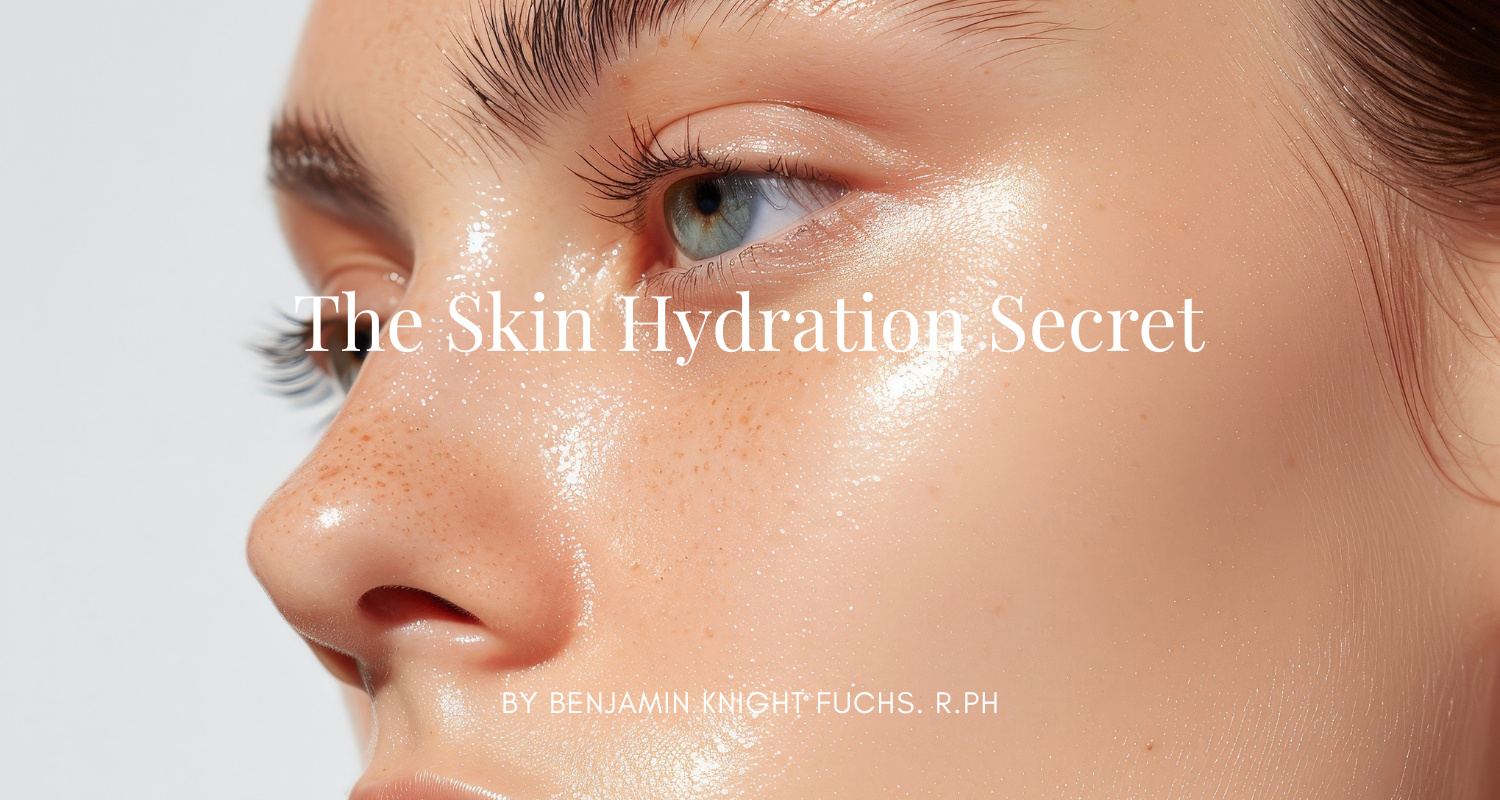
The Skin Hydration Secret
The Skin Hydration Secret
By Benjamin Knight Fuchs, R.Ph.
Hydration: it's the holy grail of skincare! Every year, we spend billions of dollars chasing that plump, dewy glow with moisturizers, creams, and serums. But sometimes it feels like we’re layering product after product without really knowing what’s happening beneath the surface.
Let’s go a little deeper. While moisturizers are important, the real magic behind hydrated, glowing skin starts with collagen. Yes — that skincare buzzword is more than just hype. Collagen plays a huge role in how hydrated your skin actually is.
Think of collagen as a super-absorbent sponge inside your skin. It holds onto water and helps keep everything plump and firm. But this sponge isn’t just a blob — it’s made of tightly wound fibers, like a perfectly coiled ball of yarn. And when those fibers start to break down or unravel, your skin’s ability to stay hydrated takes a hit.
That’s why maintaining strong, healthy collagen is essential — not just for firmness, but also for keeping your skin hydrated from the inside out.
Collagen acts like healthy soil in a garden. If the soil is rich and structured, the plants stay nourished and hydrated longer — even between watering. Your skin works in a similar way.
Now for the exciting part: you can actively support your skin’s collagen with powerful skincare ingredients and smart habits. Here’s how:
1. Retinol
Retinol (a form of vitamin A) is a powerhouse for collagen production. It tells your skin cells to act younger, encourages new collagen synthesis, and even helps smooth fine lines and wrinkles. Bonus: by building a stronger collagen network, retinol also helps your skin retain more water, improving hydration.
2. Fat-Soluble Vitamin C
You’ve probably heard of vitamin C, but did you know that fat-soluble forms, like Tetrahexyldecyl Ascorbate, are incredibly stable and penetrate deeper into the skin? They protect your existing collagen from damage, support the production of new collagen, and help your skin stay firmer and more hydrated over time.
3. Hydroxy Acids (AHAs & BHAs)
These exfoliating acids (like glycolic, lactic, and salicylic acid) gently remove dead skin cells, allowing your other products to absorb better. And while overdoing exfoliation can cause dryness, when used properly, hydroxy acids can actually support hydration by stimulating collagen production and refreshing the skin's surface.
4. Chemical Peels
Peels take exfoliation a step further, helping reveal smoother, more radiant skin. They may seem harsh, but when followed with the right aftercare, peels can stimulate collagen and even increase your skin’s natural production of hyaluronic acid, which holds moisture like a magnet.
Many people avoid acids and peels because they fear dryness. And while that can happen if overused, the truth is: these methods can lead to deeper, long-term hydration when they help your skin build a stronger collagen foundation.
Think of it like pruning a plant. At first, you remove something — but it grows back stronger, healthier, and more vibrant.
💧 Tips to keep your skin hydrated — even after exfoliation:
-
Start slow: Use low-strength acids once or twice a week and increase gradually.
-
Moisturize smart: After exfoliating, choose gentle, nourishing products with hyaluronic acid, fat-soluble Vitamin C, ionic minerals, and cholesterol to lock in moisture and support your skin barrier.
-
Listen to your skin: If it feels tight, irritated, or overly dry, scale back. Hydrated skin is happy skin — not stressed skin.
A holistic approach to hydration:
-
Boost collagen from within: Eat a balanced diet rich in protein, vitamin C, and other nutrients that support collagen production. And yes — drink water throughout the day.
-
Use the right serums: Look for products with retinol, fat-soluble Vitamin C, ionic minerals, and hyaluronic acid for powerful results.
-
Mind your lifestyle: Sleep, stress, nutrition, and even digestion affect how well your body produces collagen. A balanced lifestyle is part of your skincare routine too.
Hydrated, glowing skin isn’t just about what you put on — it’s about how you care for your skin from the inside out. By supporting collagen production with smart skincare, nourishing ingredients, and healthy habits, you’re giving your skin the tools it needs to glow — naturally.
So next time your skin feels a little dry, don’t just reach for the nearest cream. Think deeper. Think collagen.
Benjamin Knight Fuchs, R.Ph.


